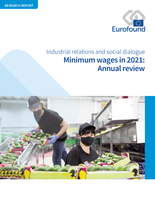Minimum wages have risen significantly in 2022, as the EU Member States leave behind the cautious mood of the pandemic. However, rising inflation is eating up these wage increases, and only flexibility in the regular minimum wage setting processes may avoid generalised losses in purchasing power among minimum wage earners.
Γλώσσες
Κύριο μενού
Ευρωπαϊκή Ένωση
Αρχική » Ευρωπαϊκή Ένωση
Υπηρεσίες του Ο.ΜΕ.Δ.
Οι υπηρεσίες του Ο.ΜΕ.Δ. παρέχονται στις συνδικαλιστικές οργανώσεις εργοδοτών και εργαζομένων καθώς και σε μεμονωμένους εργοδότες σε επίπεδο επιχείρησης που επιθυμούν να απευθυνθούν σε αυτόν. Μεταξύ των εργοδοτών συγκαταλέγεται και το Ελληνικό Δημόσιο, για τους εργαζόμενους με σχέση εργασίας ιδιωτικού δικαίου στις Δημόσιες υπηρεσίες, Ν.Π.Δ.Δ. και Ο.Τ.Α.
Υπηρεσίες
Στοιχεία επικοινωνίας
Διεύθυνση: Πλατεία Βικτωρίας 7, 104 34 Αθήνα
Τ: +302108814922
E: e-mail: [email protected]
Ωράριο λειτουργίας: Δευτέρα – Παρασκευή, 09.00 – 17.00
Πνευματικά Δικαιώματα - Όροι χρήσης
Copyright © 2014 Οργανισμός Μεσολάβησης & Διαιτησίας All rights reserved.
Unless otherwise stated, the content of this page is licensed Under Creative Commons Attribution-NonCommercial-ShareAlike 3.0



